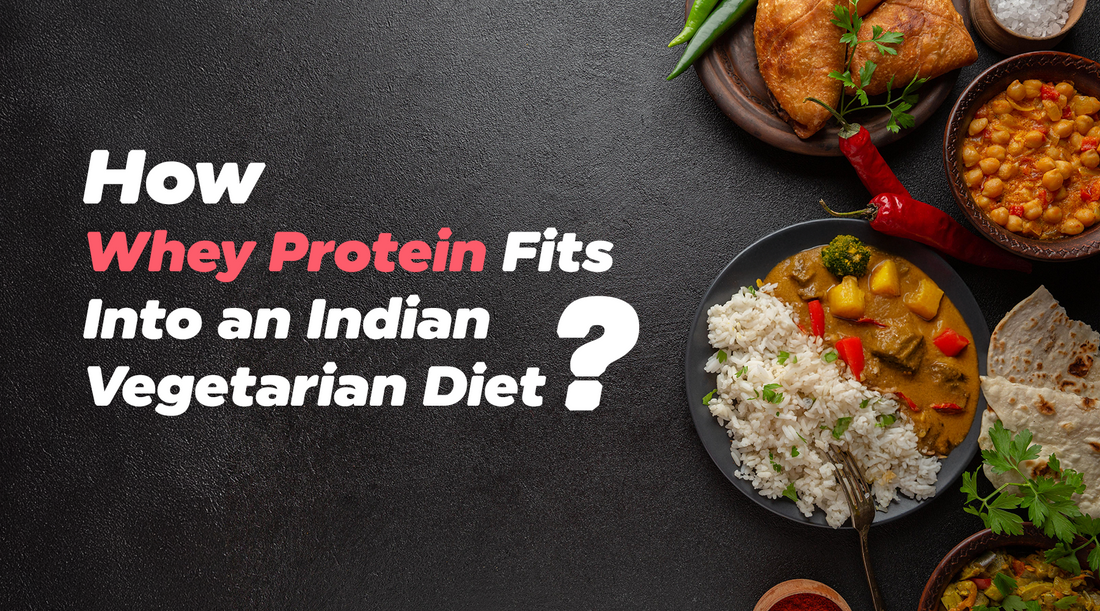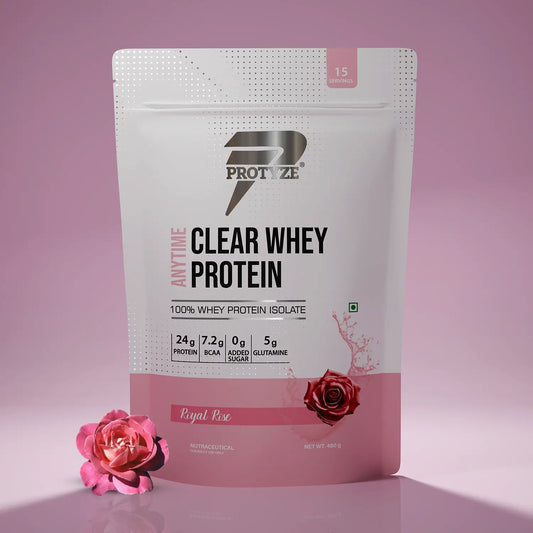For anyone on a vegetarian diet, protein plays a crucial role. It's the building block of life—helping with muscle growth, tissue repair, immune function, and even hormone regulation. However, unlike omnivores who can easily meet their protein needs through a wide range of animal-based foods, vegetarians need to be more mindful of how they are getting their protein, as some plant-based sources can lack key amino acids or be difficult for the body to absorb.
Common Challenges Vegetarians Face in Meeting Protein Needs
Vegetarians often face the challenge of getting enough high-quality protein—proteins that contain all nine essential amino acids, which our body can't produce on its own. While there are many plant-based sources of protein, such as lentils, chickpeas, and tofu, they sometimes lack one or more of these amino acids. Plus, certain plant proteins are not as easily absorbed as animal-based proteins.
How Whey Protein Can Be a Game-Changer
This is where whey protein comes into play. Derived from milk, whey protein is a complete source of protein with all the essential amino acids in an easily digestible form. It’s a game-changer for vegetarians who may be struggling to meet their protein goals.
Whether you're a fitness enthusiast, trying to lose weight, or simply aiming to improve overall wellness, incorporating best whey protein into your diet can help you bridge the gap and achieve a balanced, healthy lifestyle.
Understanding Whey Protein
Whey protein is a byproduct of cheese production, found in the liquid that remains after milk has been curdled and strained. It's a high-quality, fast-digesting protein that is rich in essential amino acids, particularly leucine, which plays a key role in muscle protein synthesis. Whey is considered one of the best protein sources due to its superior biological value (BV) and rapid absorption rate.
How is whey protein Derived from Milk?
When milk is processed into cheese, the curd (solid) and whey (liquid) separate. The whey protein is then extracted and filtered to remove fat and lactose, resulting in a concentrated form of protein that is easily absorbed by the body. This is typically dried into a powder, making it convenient for supplementation.
Different Types of Whey Protein (Concentrate, Isolate, Hydrolysate)
There are three main types of whey protein:
- Whey Protein Concentrate (WPC): This is the least processed form of whey, containing about 70-80% protein by weight, with the remaining being fats and carbohydrates. It’s a great option for those looking for a natural, whole food-based supplement.
- Whey Protein Isolate (WPI): More refined than concentrate, isolate contains about 90% or more protein, with very little fat and carbs. This makes it ideal for those who want a purer protein source with fewer calories.
- Whey Protein Hydrolysate (WPH): This type is pre-digested, meaning it’s broken down into smaller peptides for faster absorption. It's often used in medical or sports nutrition due to its quick bioavailability.
Nutritional Benefits of whey protein
Whey protein is packed with high-quality protein, low in fat and carbohydrates, and contains an abundance of essential nutrients. Beyond muscle building, it’s known for boosting immunity, promoting fat loss, and supporting overall health. It also contains bioactive compounds like lactoferrin, immunoglobulins, and glutathione, which offer antioxidant benefits.
Protein Deficiency in Indian Vegetarian Diets
In India, vegetarian diets are incredibly diverse, with many people opting for plant-based meals. However, protein intake is often inadequate due to an over-reliance on carbohydrates like rice and wheat. Traditional vegetarian sources such as dals, vegetables, and dairy are often low in protein or lack certain essential amino acids, making it challenging to get a complete protein profile from food alone.
Common Vegetarian Protein Sources in India
Vegetarian Indians commonly rely on:
- Lentils and Pulses: A rich source of protein but often lacking one or more essential amino acids.
- Dairy: Milk, paneer, and yogurt provide good protein, but the intake can be limited depending on individual dietary habits.
- Nuts and Seeds: Almonds, peanuts, chia seeds, and flaxseeds are great protein sources, but again, they may not provide all the amino acids the body needs.
- Soy Products: Tofu and tempeh are excellent plant-based protein sources, but not everyone incorporates them into their daily meals.
Limitations of Plant-Based Proteins
While plant-based proteins are beneficial, they typically come with some challenges:
- Lower Bioavailability: The body might not absorb plant proteins as efficiently as animal-based proteins.
- Incomplete Amino Acid Profile: Most plant proteins (with the exception of soy and quinoa) don’t provide all nine essential amino acids in the right proportions, meaning they need to be combined to create a complete protein.
Why Whey Protein is a Great Addition
Following are the Points showcasing how whey protein is a great addition in our Indian Vegetarian Diet:
1. High Biological Value and Complete Amino Acid Profile
Whey protein has a high biological value (BV), meaning your body can efficiently use it for growth and repair. Unlike many plant-based proteins, whey provides all the essential amino acids in the right proportions, which is crucial for muscle recovery and overall health.
2. Fast Absorption Compared to Plant-Based Proteins
Whey protein is absorbed quickly into the bloodstream, making it ideal for muscle recovery after workouts. The fast digestion rate means the body can start using the protein right away, unlike plant-based proteins, which may take longer to break down.
3. Helps in Muscle Recovery and Overall Health
Whey protein is especially beneficial for muscle recovery, making it an essential part of a fitness enthusiast’s diet. But it also helps with general wellness by supporting immune health, boosting metabolism, and promoting healthy skin, hair, and nails.
4. Easy to Incorporate into Daily Meals
Whey protein is versatile and easy to include in your daily routine. Whether you mix it into smoothies, shakes, or traditional Indian dishes, it adds a convenient protein boost without disrupting your meal structure.
Is Whey Protein Vegetarian?
There’s a common misconception that whey protein is not suitable for vegetarians since it’s derived from milk. However, as long as you’re consuming dairy (lacto-vegetarian diet), whey protein is a great option. It’s important to note that whey protein is not suitable for vegans, as it comes from an animal source.
Lacto-Vegetarian Compatibility
If you follow a lacto-vegetarian diet, then whey protein is compatible with your eating habits. It can be an excellent addition, providing you with high-quality protein that complements other vegetarian food sources.
Not Suitable for Vegans
Whey protein is not an option for those following a vegan diet because it’s derived from milk. Vegans will need to rely on plant-based protein alternatives such as pea protein, soy protein, or brown rice protein.
Whey Protein vs. Indian Vegetarian Protein Sources
When compared to common Indian vegetarian protein sources, whey protein stands out due to its complete amino acid profile and ease of digestion. For instance:
- Dal: While high in protein, it lacks some essential amino acids, particularly methionine.
- Paneer: A good source of protein, but also high in fat.
- Soya: A complete protein but can be difficult for some to digest.
- Quinoa: A complete plant-based protein, but the taste and texture may not appeal to everyone.
- Nuts: While rich in protein, they are also calorie-dense and don’t provide a complete amino acid profile.
Complementing Plant Proteins with Whey Proteins
To create a balanced vegetarian diet, it’s ideal to complement plant proteins with whey protein. By combining sources like dal and whey, you ensure that you’re getting the full spectrum of amino acids for optimal health.
Benefits of Whey Protein for Different Lifestyles
Given Below are Some of the Points Mentioning how whey protein is beneficial for different lifestyles:
1. For Fitness Enthusiasts
Whey protein is a go-to for muscle building and recovery. Its fast absorption helps repair muscle tissues after intense workouts, allowing you to recover quicker and push harder in your next training session.
2. For Weight Management
Whey protein helps with weight loss by promoting satiety and reducing hunger. When you’re on a calorie-restricted diet, it helps keep you feeling full, reducing the temptation to snack between meals.
3. For General Wellness
Beyond fitness, best whey protein supports overall health. It boosts immunity, helps with metabolism, and even supports healthy skin, hair, and nails due to its high content of amino acids and antioxidants.
4. For Elderly Individuals
As we age, maintaining muscle mass becomes increasingly important. Whey protein can help prevent muscle loss in the elderly, helping them stay strong and active in their later years.
How to Incorporate Whey Protein into an Indian Diet
In India, we love our traditional meals, and incorporating India’s best whey protein is easier than you think. You can add it to:
- Roti or Paratha: Mix whey protein powder into the dough to make protein-rich flatbreads.
- Dosa or Idli Batter: Add a scoop of whey protein to your dosa batter for a protein-packed breakfast.
- Lassi or Smoothies: Blend whey protein with fruits, yogurt, or milk for a refreshing and nutritious drink.
Simple Recipes
- Whey Protein Smoothie: Blend whey protein with banana, almond milk, and a spoonful of peanut butter for a delicious and filling smoothie.
- Protein-Packed Paratha: Mix whey protein into whole wheat flour to make a protein-rich paratha, perfect for breakfast or a quick snack.
- Whey-Infused Halwa: Give traditional carrot or moong dal halwa a protein boost by adding a scoop of whey protein to the mixture.
Best Times to Consume
- Morning: Kick-start your day with a protein-packed smoothie or mixed into your breakfast.
- Post-Workout: Consume whey protein after a workout to help muscle recovery.
- Bedtime: A scoop of whey before bed helps with muscle repair overnight.
Choosing the Right Whey Protein
When selecting whey protein, look for products with:
- Minimal additives: Avoid products with artificial colors, flavors, or sweeteners.
- Low sugar content: Opt for whey protein with little to no added sugars.
- High-quality protein source: Check that it contains high-quality protein with a good amino acid profile.
Whey Protein Concentrate vs Whey Protein Isolate
Whey protein concentrate is more affordable and has a broader nutritional profile with some fat and carbs, making it suitable for general use. Whey isolate is purer with fewer carbs and fats, ideal for those watching their calorie intake.
Be cautious of products that contain fillers or low-quality protein sources. Always check labels to ensure you’re getting the best whey protein in India.
Addressing Concerns & Myths Related to Whey Protein
Q1: Is Whey Protein Safe for Long-Term Use?
Yes! Whey protein is safe for long-term use if taken in moderation as part of a balanced diet.
Q2: Does it Cause Kidney Damage or Digestive Issues?
For healthy individuals, whey protein does not cause kidney damage. However, those with pre-existing kidney conditions should consult a doctor. Digestive issues can be avoided by choosing high-quality whey and ensuring adequate hydration.
Q3: Can it Be Taken Daily?
Yes, whey protein whey can be taken daily as part of a balanced diet to meet your protein needs.
Conclusion
Whey protein is an excellent addition to a vegetarian diet. It provides a complete, high-quality protein source that’s easy to digest and helps support muscle recovery, overall health, and wellness. If you're vegetarian and looking to optimize your nutrition, consider adding whey protein whey isolate to your diet. It’s a versatile, effective way to meet your protein needs and support a healthy, active lifestyle. Choose a high-quality whey protein isolate in India, and find creative ways to incorporate it into your meals. It’s a simple, effective way to ensure you’re getting the protein you need to thrive!





